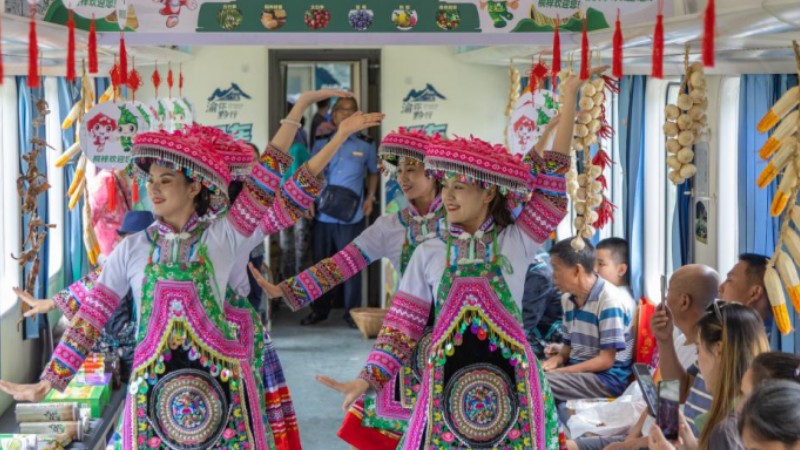Feature: China's rural revitalization in the eyes of Cambodian youths
PHNOM PENH, July 12 (Xinhua) -- Nop Ratanak, a member of the Cambodian People's Party (CPP)'s Central Youth, was deeply impressed by how east China's Zhejiang Province has transformed rural villages into beautiful green spaces boasting fresh air, lucid waters and lush mountains.
"As a Cambodian youth, I'm very proud to have an opportunity to participate in this study tour, especially to see the development of this province," said Ratanak, referring to his experience earlier this year with a 29-member team of the CPP's Central Youth, which took him to villages such as Yucun and Wusi in Zhejiang.
During his visit to Yucun, Ratanak learned that cement mills and mines were once the backbone of the village economy. Although these industries offered lucrative employment opportunities, it did not take long for the villagers to witness the detrimental effects. The thick dust and waste generated by the plants made their hometown almost uninhabitable and adversely affected their quality of life.
"Now in Yucun, I was greeted by the picturesque scenery of traditional houses with white walls and black tiles, colorful flower fields and exquisite lotus ponds ... all of which were hard to imagine in this once a heavily-polluted village," said Ratanak.
Those transformations have been made possible thanks to the Green Rural Revival Program, a province-wide project proposed by Chinese President Xi Jinping when he served as the secretary of the Communist Party of China (CPC) Zhejiang Provincial Committee in 2003 to improve the eco-environment of villages and rural residents' quality of life.
Xi has always placed great emphasis on striking a balance between environmental protection and economic development. In August 2005 when he visited Yucun, he first put forward his now widely-known concept of "lucid waters and lush mountains are invaluable assets."
His vision resonates with the rural revival program, which involves renovating about 10,000 incorporated villages and transforming about 1,000 central villages among them into examples of moderate prosperity in all respects. Over two decades, the program has created tens of thousands of beautiful villages, fundamentally changing the face of the province's countryside.
President Xi's concept promotes harmony between people and nature, as well as helps protect the environment, said Ratanak. "I think this meaningful concept has been actively carried out in all regions of the country, giving top priority to ecological and green development," he said.
After the abolishment of the heavy-polluting industries, the local ecology in Yucun significantly improved. As a result, the beautiful village experienced a surge in tourism, which has now become the primary source of income for the local community. And the story of Yucun is just an epitome of successfully implementing the green growth model in China's rural areas.
Say Mengkim, another member of the CPP's Central Youth who attended the study tour, also witnessed China's rural development. He said rural areas in Zhejiang have enjoyed green and sustainable development under the leadership of the CPC and the Chinese government.
"This is an invaluable experience received during this study tour," he said, noting the program has narrowed the development gap between cities and villages, greatly benefiting low-income people and underdeveloped areas.
According to the provincial department of agriculture and rural affairs, through this program, new jobs related to agricultural development and rural entrepreneurship have been created, with over 47,000 entrepreneurs engaged in rural innovation to date.
Now, the rural areas in Zhejiang are equipped with extensive road systems and reliable power grids. Cultural facilities and medical centers have also been improved.
The successful implementation of the program in Zhejiang illustrates President Xi's effective strategy in revitalizing rural areas, said Ratanak, adding that it has set an excellent example for Cambodia and other developing countries to revitalize their rural areas with a primary focus on green and sustainable development.
Data show that by the end of 2017, 97 percent of the villages in Zhejiang had reached the target of transforming polluted waterways into clean rivers with potable water through water management, waste management, and recycling. In 2018, the program won the United Nations Environment Programme's Champions of the Earth award.
Turning those villages into popular tourist destinations has inspired developing countries, including Cambodia, to prioritize ecological and green development, said Ratanak.
"Cambodia can learn lessons from China's rural revitalization experience to promote high-quality and modern economic development based on economic potential in each province," he added.
Mengkim said that China's efforts to promote high-quality development, green development and a low-carbon footprint will encourage other countries to develop together with China to achieve mutually beneficial cooperation and win-win results.
"We can teach our people in rural areas to take care of natural resources and leave behind a good environment," he said.
Photos
Related Stories
- Delicious local delicacy drives rural revitalization in east China
- China's Zhejiang province boosts rural revitalization with intelligent agriculture
- China ramps up financial support for rural revitalization
- Rock climbing boom leads poor county in S China to prosperity
- Chinese bonsai industry paints rosy economic outlook in Guangxi
Copyright © 2023 People's Daily Online. All Rights Reserved.









